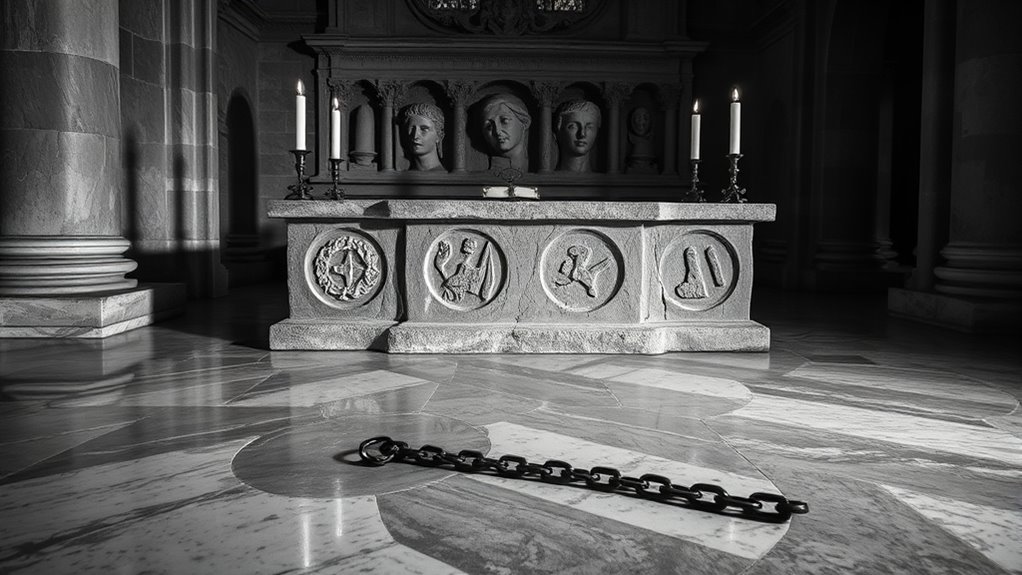The unforgivable sin, based on biblical teachings, involves deliberately rejecting or maligning the Holy Spirit’s work, which is seen as unpardonable even if you feel remorse later. It’s not just about a mistake but a persistent rejection of divine grace and truth. Many believe it’s the ultimate act of spiritual defiance. To understand why this sin carries such weight and how different faiths view it, explore further—you’ll find meaningful insights ahead.
Key Takeaways
- The unforgivable sin, or blasphemy against the Holy Spirit, involves persistent rejection or defamation of God’s divine work.
- It is considered unpardonable because it signifies a deliberate refusal to accept God’s grace and truth.
- Biblical examples include attributing Jesus’ miracles to Satan, as seen in Mark 3:28-30.
- The sin reflects a hardened heart that resists divine influence, leading to spiritual separation from God’s mercy.
- Different faiths interpret it variably, but it generally emphasizes the severity of rejecting divine truth and grace.
Origins of the Unforgivable Sin in Religious Texts

The concept of the unforgivable sin originates from religious texts, most prominently the Christian Bible. It refers to a specific sinful behavior that, according to scripture, cannot be forgiven, even by divine mercy. This idea emerges from passages where certain actions are considered so grave that they sever the possibility of divine forgiveness. The origins highlight the importance of understanding the boundaries of moral conduct and the seriousness with which some sins are regarded. While many sinful behaviors can be forgiven through repentance, the unforgivable sin stands apart, emphasizing its unique status. Recognizing its biblical roots helps you grasp why some acts are viewed as beyond redemption, shaping religious teachings about morality, repentance, and divine justice. Additionally, the interpretation of this sin often involves understanding the dream symbols associated with guilt, rejection, or spiritual conflict that may reflect subconscious concerns about moral transgressions. Exploring the moral boundaries outlined in religious texts can deepen your understanding of the significance and implications of this concept. Moreover, understanding these religious doctrines can provide insight into how different faiths interpret moral accountability and forgiveness.
Biblical Interpretations and Teachings

You’ll find that biblical references to the unforgivable sin vary depending on how scripture is interpreted. Different scholars debate the meanings of key passages and their relevance today. These interpretative differences shape how believers understand what constitutes this unforgivable act. Understanding the Gold IRA options available can also influence how individuals plan their long-term financial security, paralleling the importance of clear doctrinal guidance. Additionally, the way state tax laws impact IRA withdrawals demonstrates the complexity of financial planning and the need for informed decision-making.
Scriptural References and Contexts
Understanding the scriptural references surrounding the unforgivable sin reveals the depth of its biblical significance. In the Gospels, Jesus warns against blaspheming the Holy Spirit, highlighting a sin rooted in persistent sinful behavior that resists spiritual forgiveness. Key passages include Matthew 12:31-32, Mark 3:28-30, and Luke 12:10, which emphasize the gravity of attributing the Spirit’s work to evil. These references show that this sin involves a conscious rejection of God’s grace and a hardened heart toward spiritual truths. The contexts clarify that it’s not about a single mistake but about a deliberate, ongoing refusal to repent and accept forgiveness—making it unforgivable because it cuts off the possibility of reconciliation with God.
Interpretative Variations and Debates
Interpreting the unforgivable sin has sparked significant debate among theologians and biblical scholars, as different traditions and perspectives offer varying understandings of its nature and severity. Some see it as a clear moral dilemma, emphasizing the deliberate rejection of God’s forgiveness, while others view it as a more nuanced spiritual issue. Many argue that the debate hinges on whether this sin permanently severs the possibility of spiritual forgiveness or if it reflects a hardened heart beyond redemption. Interpretations vary widely, with some believing it’s tied to specific actions, and others seeing it as a state of mind or attitude that constitutes a spiritual barrier. These differing views challenge believers to contemplate how moral dilemmas and the concept of forgiveness influence their understanding of divine mercy and human accountability. Additionally, the discussion often touches on how different interpretative approaches can influence the perception of divine justice and mercy. Moreover, understanding the contrast ratio in biblical texts can shed light on how the severity of this sin is perceived across different theological frameworks. Recognizing that creative practice can be a vital tool for personal reflection, some scholars suggest that engaging in creative or contemplative activities may offer insights into complex spiritual issues like this. Furthermore, insights from Personality Test research may help individuals reflect on their emotional and spiritual states when considering such profound theological questions.
The Role of Blasphemy Against the Holy Spirit

Blasphemy against the Holy Spirit involves outright rejection or defamation of God’s work, which the Bible calls unforgivable. You’ll see examples in Scripture that highlight how this sin differs from others and what it signifies. Understanding the consequences helps clarify why this sin is considered so severe. This concept can be compared to the fundamentals of sound design, where each element plays a crucial role in shaping the overall message. Recognizing the severity of this sin underscores its unique place in theological teachings and the importance of understanding its implications. Additionally, some interpret this sin as a profound emotional rejection, which makes it especially serious in spiritual contexts. Just as self watering plant pots are designed to maintain consistent moisture effortlessly, the unforgivable nature of this sin reflects a persistent and unchanging rejection of divine grace.
Definition of Blasphemy
What exactly does it mean to commit blasphemy against the Holy Spirit? It’s a serious act that involves rejecting or maligning the divine work of the Holy Spirit, especially when it comes to understanding spiritual truths. This isn’t just disrespect; it’s a deliberate refusal to accept God’s grace, creating moral dilemmas for many believers. You might wonder if it’s an irreversible act, but it also touches on the possibility of spiritual redemption — whether someone can turn away from this sin. To grasp its full meaning, consider that blasphemy against the Holy Spirit involves:
- Denying the Spirit’s power and role in salvation
- Persistently dismissing the truth despite clear evidence
- Hardened rejection that blocks repentance and forgiveness
- Holistic healing through spiritual growth and understanding can help address the moral and emotional struggles associated with this sin. Recognizing the importance of emotional regulation and support systems can be crucial for individuals grappling with feelings of guilt or despair related to this sin. Additionally, understanding spiritual discernment is vital for recognizing genuine faith and avoiding the trap of hardened rejection. Moreover, understanding the broader context of cybersecurity vulnerabilities and how they can be exploited helps appreciate the significance of safeguarding one’s spiritual and emotional well-being in today’s complex environment. Developing spiritual resilience can also be a key component in overcoming feelings of condemnation and fostering hope for spiritual renewal.
Biblical Examples Explored
The Bible provides several compelling examples that illustrate the gravity of blasphemy against the Holy Spirit. In Mark 3:22-30, Jesus warns that attributing His work to Satan reveals a refusal to recognize the Holy Spirit’s power, highlighting your moral responsibility and spiritual accountability. When the Pharisees accused Jesus of casting out demons by Beelzebul, they deliberately rejected the Holy Spirit’s work, illustrating how persistent rejection can lead to unforgiveness. These examples serve as a stark reminder that dismissing or maligning the Holy Spirit’s influence demonstrates a hardened heart and a conscious choice to oppose God’s truth. Recognizing these biblical instances helps you understand the serious nature of blasphemy and your ongoing moral and spiritual responsibilities. Additionally, understanding the Holy Spirit’s role in guiding believers emphasizes the gravity of intentionally rejecting its influence, especially considering the spiritual accountability involved in such actions. It is important to note that the interpretation of prophetic dreams can vary, but the biblical emphasis on rejecting divine messages underscores the significance of aligning one’s heart with God’s truth. Moreover, the category of cookie types reflects how different forms of rejection or acceptance can impact your spiritual and moral journey.
Consequences of Rejection
When you persist in rejecting the Holy Spirit’s work, the consequences can be profound and irreversible. You face moral dilemmas that challenge your spiritual accountability, risking a hardened heart that becomes resistant to grace. Blasphemy against the Holy Spirit is seen as the ultimate rejection of divine truth, leading to a state where reconciliation becomes impossible. This rejection can result in:
- A deepening moral blindness, making it harder to discern right from wrong
- A loss of spiritual sensitivity, dulling your conscience
- An eternal separation from God’s mercy and forgiveness. Recognizing the significance of spiritual accountability underscores the importance of openness to divine guidance, as ignoring these prompts can have lasting repercussions. These outcomes underscore the seriousness of dismissing the Holy Spirit’s prompting, emphasizing how spiritual accountability requires openness rather than stubborn rejection. The consequences serve as a stark reminder of the importance of humility and acknowledgment of divine truth. Additionally, understanding the role of spiritual services such as Efficient General Ledger Coding can help ensure transparency and integrity in one’s spiritual and moral journey. Being aware of religious teachings about repentance and forgiveness can also provide pathways to reconciliation if one recognizes their spiritual missteps.
Variations of the Concept Across Different Faiths

Across different faiths, the concept of an unforgivable sin varies in scope and significance, reflecting diverse theological interpretations and moral frameworks. In interfaith dialogue, you’ll notice that some religions emphasize specific acts as unforgivable, while others focus on the attitude behind the act. For example, Christianity often highlights blasphemy against the Holy Spirit as unforgivable, whereas in Buddhism, unrepentant karma can be viewed as spiritually irreversible. Comparative theology reveals that these differences stem from each faith’s core beliefs about divine mercy, justice, and human nature. Recognizing these variations helps you understand that what’s unforgivable in one tradition may not be in another, emphasizing the importance of context and interpretation within different spiritual frameworks.
Historical Perspectives on Unforgivable Sins

Have perceptions of unforgivable sins changed over time? Historically, views have shifted from rigid, church-driven doctrines to more nuanced understandings. Medieval folklore often depicted certain sins, like blasphemy or sacrilege, as unforgivable, emphasizing divine punishment. Philosophical inquiries challenged these views by questioning moral absolutes and exploring human morality’s complexity. During the Enlightenment, thinkers argued that forgiveness might be possible, even for the gravest offenses. These evolving perspectives reflect society’s changing attitudes toward morality and redemption. Key points include:
- Medieval folklore reinforced strict notions of unforgivable sins as divine offenses.
- Philosophical inquiries introduced debates about moral absolutes and human capacity for forgiveness.
- Over time, cultural shifts fostered a more compassionate view, acknowledging potential for redemption even in severe cases.
Common Misconceptions and Clarifications

Many people believe that certain sins are inherently unforgivable, but this is a common misconception. Sinful behavior doesn’t automatically exclude you from divine forgiveness. Sometimes, people think that once they’ve committed a serious sin, they’re doomed forever. However, many spiritual teachings emphasize that no sin is beyond redemption if you genuinely repent and seek forgiveness. The idea that some sins are unforgivable often stems from misunderstandings or misinterpretations of religious texts. In reality, divine forgiveness is available to all who sincerely turn away from sinful behavior and ask for mercy. Recognizing this helps you avoid unnecessary despair and encourages you to pursue reconciliation, understanding that forgiveness is always within reach, regardless of the severity of your actions.
The Psychological and Moral Dimensions

Understanding forgiveness often involves exploring its psychological and moral aspects. You might face moral dilemmas that challenge your sense of right and wrong, influencing how you process unforgivable acts. These dilemmas can cause significant psychological impacts, such as guilt, shame, or emotional exhaustion. Recognizing these effects helps you understand why some offenses feel unforgivable.
- Moral dilemmas force you to weigh justice against mercy, shaping your response.
- Psychological impacts include internal conflicts that hinder forgiveness.
- Personal values and beliefs deeply influence how you perceive unforgivable acts.
Modern Perspectives and Debates

Modern interpretations of the unforgivable sin spark ongoing ethical and theological debates. You might question whether traditional views still hold in today’s diverse beliefs or if new perspectives challenge old assumptions. These challenges push you to contemplate how society and faith communities respond to such profound accusations today.
Contemporary Interpretations and Challenges
Contemporary debates surrounding the unforgivable sin often challenge traditional interpretations, prompting scholars and theologians to reexamine its significance in today’s context. They question how modern perspectives influence the understanding of its moral implications and spiritual consequences. Some argue that labeling a sin unforgivable may hinder spiritual growth, while others see it as a crucial warning about rejecting divine grace. Key issues include:
- The evolving nature of moral standards and their impact on defining the sin
- The role of cultural context in shaping contemporary interpretations
- The balance between compassion and accountability in spiritual practice
These debates encourage you to reflect on whether the unforgivable sin remains a fixed doctrinal point or a flexible concept adaptable to modern moral sensibilities. Such discussions push for a deeper understanding rooted in current spiritual and moral challenges.
Ethical and Theological Debates
Ethical and theological debates about the unforgivable sin often center on whether its severity remains relevant in today’s moral landscape. You might wonder if modern moral dilemmas challenge traditional views or if ethical boundaries have shifted. Some argue that labeling a sin as unforgivable discourages compassion, while others believe it emphasizes the gravity of spiritual rebellion. These debates explore if past doctrines still hold firm or if they need reinterpretation amid changing societal values. You’re encouraged to contemplate how contemporary perspectives influence the understanding of divine justice and mercy. Ultimately, these discussions question whether the unforgivable sin’s severity serves as a timeless moral boundary or if it should adapt to reflect current ethical standards.
Implications for Believers and Non-Believers

The implications of the unforgivable sin differ markedly for believers and non-believers, shaping how each perceives guilt, redemption, and spiritual standing. For believers, understanding sinfulness implications helps them recognize the importance of repentance and staying within forgiveness boundaries. They see this sin as a warning to avoid hardening their hearts and losing hope for divine mercy. Non-believers, however, might interpret the sin as a barrier to spiritual salvation, influencing their view of divine justice and their own worthiness. Recognizing these perspectives, you might consider:
- How sinfulness implications influence your sense of guilt and hope
- The importance of forgiveness boundaries in spiritual growth
- The impact on perceptions of divine justice and mercy
Personal Reflection and Understanding

Reflecting on the concept of the unforgivable sin invites you to examine your own beliefs about forgiveness, guilt, and spiritual boundaries. You may face moral dilemmas that challenge your understanding of redemption and accountability. Consider how your experiences influence your views on spiritual growth and forgiveness. Are there actions you struggle to forgive yourself for, or others have trouble forgiving? This reflection helps you identify where you draw the line between human imperfection and spiritual separation. Recognizing these boundaries allows you to deepen your understanding of your faith and moral compass. Ultimately, personal insight into these issues can foster compassion, resilience, and a clearer perspective on spiritual growth, guiding you toward a more authentic connection with your beliefs and values.
Frequently Asked Questions
Is the Unforgivable Sin Reversible or Forgivable Under Any Circumstances?
You might wonder if the unforgivable sin is ever reversible. Generally, many believe divine forgiveness and repentance possibilities are still open if you genuinely seek it, even in serious cases. However, some interpret the unforgivable sin as a complete rejection of divine forgiveness, making it unchangeable. Ultimately, your sincerity in repentance and faith are key. Keep seeking understanding and hope, knowing divine mercy can be limitless for those truly remorseful.
How Do Different Denominations Interpret the Concept of the Unforgivable Sin?
Did you know that over 30 different Christian denominations have varying views on the unforgivable sin? Denominational interpretations often differ due to doctrinal debates, with some viewing it as blasphemy against the Holy Spirit, while others see it as a lifelong rejection of faith. These differences shape how believers understand the concept, highlighting the diverse theological perspectives that influence Christian teachings worldwide.
Can Someone Unknowingly Commit the Unforgivable Sin?
You might wonder if someone can unknowingly commit the unforgivable sin. Since this sin involves a deliberate rejection of the Holy Spirit, lacking sin awareness plays a role. If you’re unaware you’re committing it, true repentance remains possible because genuine repentance requires recognition of wrongdoing. Without awareness, it’s unlikely you’ve committed the unforgivable sin, as deliberate rejection and persistent unrepentance are key components.
What Are the Spiritual Consequences for Those Who Believe They’ve Committed It?
You might wonder about the spiritual consequences if you believe you’ve committed the unforgivable sin. Coincidences can feel like signs, but remember, spiritual accountability reminds us there’s always room for forgiveness. If you’re worried about forgiveness limitations, know that genuine remorse and faith can restore your peace. Even in doubt, trust that divine mercy often surpasses our understanding, guiding you toward hope and healing rather than despair.
How Does the Concept of the Unforgivable Sin Influence Modern Religious Practice?
You see, the concept of the unforgivable sin shapes modern religious practice by fueling theological debates about faith preservation. It prompts believers to reflect on their spiritual state, encouraging repentance and sincere devotion. This idea also fosters caution, reminding followers to stay faithful and avoid actions that could jeopardize their salvation. Ultimately, it influences how communities interpret scripture and reinforce moral commitments, strengthening their collective spiritual resilience.
Conclusion
Think of the unforgivable sin as a dark cloud that looms over the landscape of faith, casting shadows on understanding and forgiveness. While interpretations vary, it reminds you that some actions can deeply sever the connection between you and the divine. But just like weather can change, so can your perspective. Keep exploring, questioning, and seeking clarity—because in the end, your spiritual journey is a path through shifting skies, always hopeful for the dawn.










